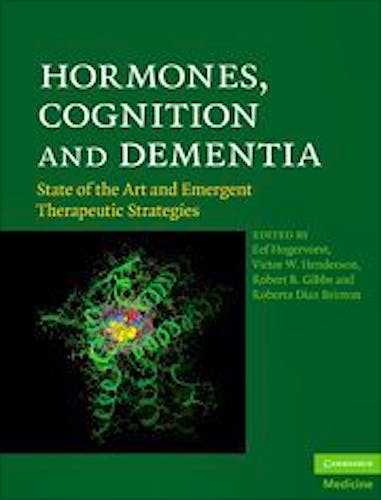

No hay productos en el carrito



Hormones, Cognition and Dementia. State of the Art and Emergent Therapeutic Strategies
Hogervorst, E. — Henderson, V. — Gibbs, R. — Diaz, R.
1ª Edición Septiembre 2009
Inglés
Tapa dura
292 pags
784 gr
19 x 25 x 2 cm
ISBN 9780521899376
Editorial CAMBRIDGE
LIBRO IMPRESO
-5%
115,53 €109,75 €IVA incluido
111,09 €105,53 €IVA no incluido
Recíbelo en un plazo de
2 - 3 semanas
Description
A decade ago, oestrogen-containing hormone therapy was viewed as a promising strategy for the prevention and treatment of dementia and age-related cognitive decline. However, treatment trials in women with Alzheimer's disease showed that oestrogens did not reverse cognitive impairment, and clinical trials in healthy older women indicated that oestrogens did not prevent cognitive decline. The Women's Health Initiative Memory Study trial even suggested an increased risk of dementia with treatment late in life. What happened? How are we to understand these findings? What are the implications for middle-aged and older women? What about testosterone, and what about men? And where do we go from here? This book brings together world-renowned experts in basic and clinical research on sex steroids, aging, and cognition to integrate existing findings with emerging new data, and offer challenging hypotheses on these key issues.
- Includes a comprehensive overview of current research into sex hormones; gives the reader a state-of-the-art perspective, ranging from cell culture to clinical trials
- Provides a multi-disciplinary approach; allows scientists and clinicians from different backgrounds to gain insight from other disciplines
- Summarizes the research and attempts to provide consensus; gives readers perspective on the many conflicting results that have been published
Contents
Preface
Part I. Estrogens and Cognition:
1. Women's Health Initiative Memory Study (WHIMS) program
2. Identifying risk-factors for cognitive change in the Women's Health Initiative
3. Estrogen therapy – relationship to longevity and prevalent dementia
in the oldest-old
4. The critical window hypothesis: hormone exposures and cognitive outcomes
after menopause
5. Animal studies that support estrogen effects on cognitive performance and
the cholinergic basis of the critical period hypothesis
Part II. Varieties of Estrogenic Therapy:
6. The healthy cell bias of estrogen action through regulating glucose metabolism
and mitochondrial function
7. Alternative estrogenic treatment regimes and the Kronos Early Estrogen Prevention
Study-Cognitive and Affective Substudy (KEEPS-CA)
8. The use of transdermal 17-estradiol in the treatment of Alzheimer's disease
9. Alternative modes of treatment: pulsatile estradiol treatment
10. In search of estrogen alternatives for the brain
Part III. Potential Modulators and Modifiers of Estrogenic Effects:
11. Progesterone regulation of neuroprotective estrogen actions
12. Clinical data of estrogen's effects in the central nervous system
13. Different forms of soy processing may determine the positive or negative
impact on cognitive function of Indonesian elderly
14. Hypothalamus-pituitary-adrenal axis activity in aging women
Part IV. Possible Genetic Factors Related to Hormone Treatment Effects:
15. Possible genetic polymorphisms related to sex steroid metabolism and dementia
in women
16. Genetics related to sex steroids: implications for Alzheimer's disease
17. Apolipoprotein E, hormone therapy and neuroprotection
18. Testosterone, gonadotrophins and genetic polymorphisms in men with Alzheimer's
disease
Part V. Testosterone, Estradiol and Men, and Sex Hormone Binding Globulin:
19. Androgens and cognitive functioning in women
20. The role of estradiol in testosterone treatment
21. Endogenous testosterone levels and cognitive aging in men
22. Clinical trials and neuroimaging studies of testosterone in men: insights
into effects on verbal memory
23. Testosterone therapy and Alzheimer's disease: potential for treatment and
prevention in women
24. Endogenous estradiol and dementia in elderly men: the roles of vascular
risk, sex hormone binding globulin, and aromatase activity
25. Testosterone regulates Alzheimer's disease pathogenesis
Part VI. Gonadotropin Effects:
26. Involvement of gonadotropins in cognitive function: implications for Alzheimer's
disease
27. The role of gonadotropins and testosterone in the regulation of beta amyloid
metabolism
28. Epilogue
29. Concluding remarks
Index.
About the Authors
Eef Hogervorst, Loughborough University
Eef Hogervorst is Professor of Biological Psychology, Department of Human Sciences,
Loughborough University, Loughborough, UK; Visiting Senior Research Fellow,
Department of Public Health and Primary Care, University of Cambridge, UK; Visiting
Professor, Department of Epidemiology and Public Health, University of Respati,
Jakarta, Indonesia.
Victor W. Henderson, Stanford University, California
Victor W. Henderson is Professor of Health Research & Policy (Epidemiology)
and of Neurology & Neurological Sciences, Stanford University, USA.
Robert B. Gibbs, University of Pittsburgh
Robert B. Gibbs is Professor of Pharmaceutical Sciences, University of Pittsburgh,
Pittsburgh, PA, USA.
Roberta Diaz Brinton, University of Southern California
Roberta Diaz Brinton is Professor of Pharmacology and Pharmaceutical Sciences,
Neuroscience and Biomedical Engineering, University of Southern California,
Los Angeles, CA, USA.
© 2026 Axón Librería S.L.
2.149.0